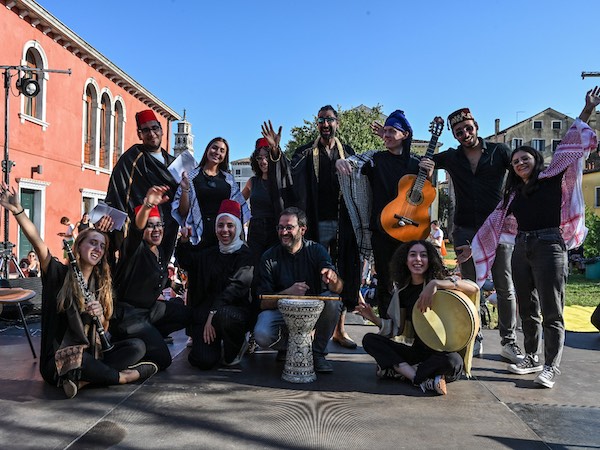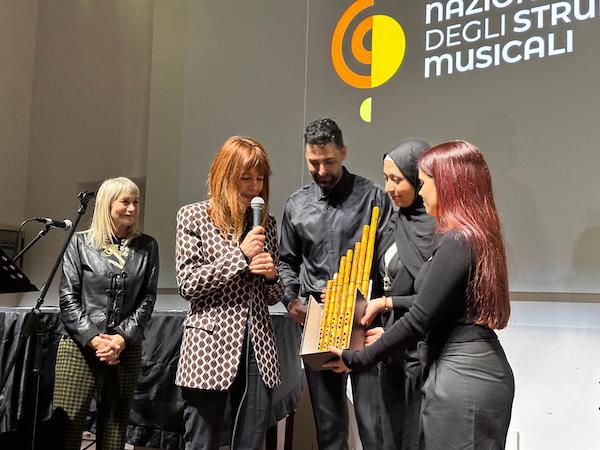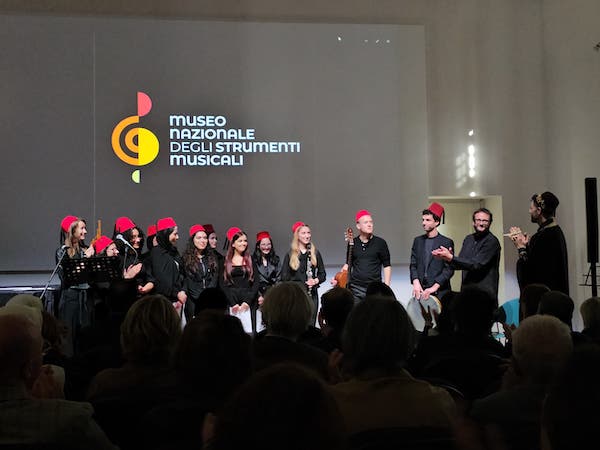At the Department of Asian and North African Studies, the Arabic Language Choir combines the teaching of Middle Eastern languages and cultures with artistic expression.
Founded two years ago by lecturers Bishara Ebeid and Vicente Martì Tormo, the choir offers students a unique opportunity to improve their language skills, familiarise themselves with lesser-known dialects, and explore the richness of Arabic folklore and culture through music and song.
The ensemble, now comprising more than 25 members, including singers and musicians, performs songs from Iraq, Syria, Lebanon, Tunisia, Egypt, Palestine, and Algeria. They are accompanied by traditional instruments such as the nay, darbouka, and tamburello, as well as the clarinet, guitar, and flute.
Before the performance, the selected songs are not only read and translated but also analysed for their historical and cultural context. In addition, the teachers prepare a transliteration of the texts to help even those who do not speak Arabic pronounce the words correctly.
"After two years, I can confidently say that we have succeeded in creating a group of friends, essentially a family, united by our shared love for Arabic music," says Bishara Ebeid, a researcher in Arabic Language and Culture and choir conductor. "We sing because we enjoy it, because it allows us to learn something new, and because through singing, we can convey messages of love, peace, and justice. Music has the ability to speak directly, deeply, and without barriers to the hearts of people."
The choir made its debut outside the classroom in December 2022, performing at the Arabic Language Day organized by Prof. Ebeid in collaboration with lecturers and Foreign Language Assistants from the Department. Other concerts took place outside Ca’ Foscari, too, including those held at the Venice Biennale in November 2023 during the closing of the Palestinian Museum's exhibition 'From Palestine: Our Past, Our Future', and at the opening of the exhibition 'Foreigners In Their Homeland' on 20 April.
On 3 May, the choir's red tarbooshes arrived in Rome at the National Museum of Musical Instruments for the Award Ceremony of the first Italo-Arabic Literary Prize, which was organised by the MED Art and Cultures Association.
Before the performance, the choir donated seven Nay, traditional wind instruments of Mesopotamian origin, to the Museum on behalf of students and lecturers of Arabic language from the Department of Asian and North African Studies.

The choir has welcomed many members over the years. Among those who have been involved since the beginning is Benedetta Pennacchi, a clarinet player and a student pursuing a Master's degree in Language and Civilisation of Asia and Mediterranean Africa. She shared, "Experiences like the one we just had in Rome can help our audience discover and immerse themselves in the Arabic language through a unique perspective, that of music sung and played by students. I would encourage anyone to participate in the choir's activities. There is often a perception that the academic world is a rigid environment, but with a choir like this, you truly have the opportunity to enhance your education through an innovative and enjoyable experience."
Christian Dagnino is currently in the second year of the MA programme in Languages, Economics, and Institutions of Asia and North Africa. Like Benedetta, he has been part of the choir since the beginning. Even though he had to temporarily stop attending rehearsals to go on Erasmus, he encourages anyone interested in learning more about the Arabic musical tradition to join the choir. "The environment is pleasant and provides the opportunity to make friends with people who share your interests. Participating in the choir not only helps improve your language skills but also offers cultural value as you learn contemporary songs. When I was in Jordan last year for a month, I found myself singing those songs frequently and they became a significant part of everyday life. This experience helped me to integrate and immerse myself even more in the local culture."
The Arabic Language Choir's call for participation is announced at the beginning of each academic year. Keep an eye on the DSAAM page to stay updated.
Discover other cultural activities at Ca' Foscari [ITA]
Members of the Arabic Language Choir
Conductor: Bishara Ebeid
Instrumental section co-ordinator: Vicente Martì Tormo
Musicians: Benedetta Pennacchi, Giovanni Maglia, Iman Aboutahir, Luigi Miotto, Sebastiano Siviero
Choristers: Alice Sartori, Ambra Hassan, Amina Hachlaf, Aya Amraoui, Christian Dagnino, El Zahra Shaker, Giorgia Previtera, India Merolla, Martina Camiolo, Martina Schiavolin, Marwa Alzubi, Matilde Piazza, Matteo Fiorini, Matteo Rubinetto, Ottavia Arestia, Silvia Ghisleni, Sohaila Achi, Valeria Hammoud, Yulia Kalachikhina











